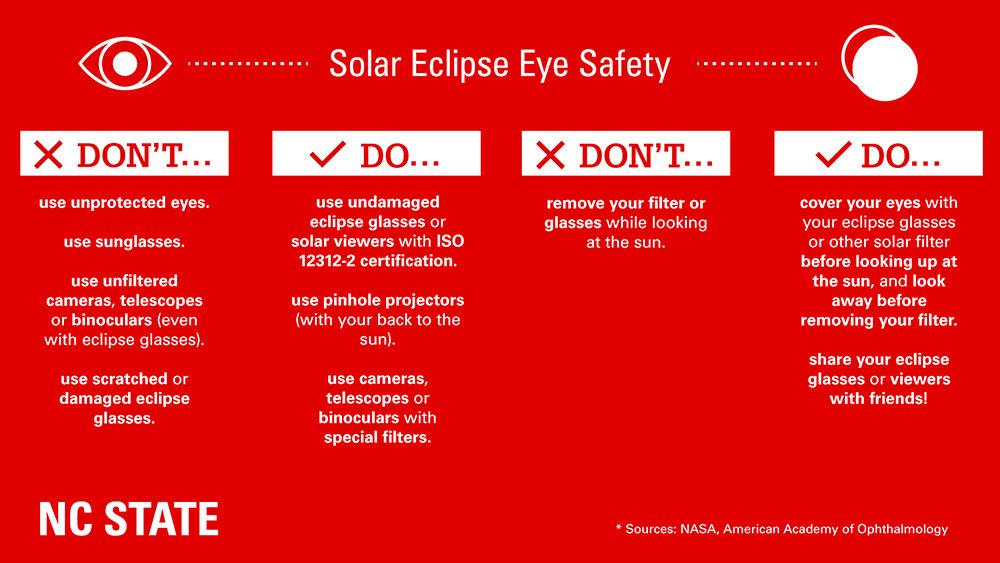Forming what looks like a bright, glowing ring of fire around an otherwise unlit sky, a total solar eclipse is not only rare in occurrence, but rare in its unmistakable beauty. Monday afternoon marks the first total solar eclipse to cross the U.S. in 99 years, and Raleigh is lucky enough to have a partial view of the action. As the solar event has the nation itching in anticipation, NC State’s College of Sciences is well-prepared to give students an optimal viewing experience for what can only be described as galactic magic. The college will hold an Eclipse Day Celebration Monday in the Brickyard from 12:30-4 p.m., with the peak of the eclipse around 2:44 p.m.
According to NASA’s website, a total solar eclipse is an event in which the moon passes between the sun and Earth. As a result, the moon constantly blocks all or part of the sun for up to three hours from a given location. NC State’s College of Science’s director of public science, Holly L. Menninger, aims to connect science to a wide public audience by further cultivating scientists’ communication and outreach skills. Menninger has worked alongside both campus and community partners to ensure the talked-about event lives up to the hype.
“Our goal is to, one, create an opportunity that is on campus to take part in observing this phenomenal and astronomical event — that’s our first and foremost goal,” Menninger said. “Our second goal is to create opportunities for people attending the event to participate in real science related to studying the eclipse.”
Menninger hopes the Eclipse Day Celebration will engage community members and scientists through research and participation, which will further develop eclipse-related knowledge — an idea more formally known as Citizen Science.
Perhaps the largest area of concern for community members and organizers alike is that of safety. Menninger explained that it is never safe to look directly in the sun without proper eye protection, so the College of Sciences has come up with many ways for students, faculty and community members to safely, and efficiently, view the eclipse. In addition to solar glasses, which will be limited in quantity, and a telescope with a solar filter, provided by the astrophysics group of the physics department, more indirect ways of viewing the sun at the Eclipse Day Celebration will be readily available. A plethora of resourceful concoctions made from cereal and snack boxes, as well as index cards with patches of aluminum foil, act as alternative viewing methods for those looking to witness the solar wonder that is a total solar eclipse.
Although many plan on travelling across the Carolinas, and beyond, to view the eclipse, the Brickyard acts as a convenient viewing spot right here on campus. As the area is a place many students utilize for social and academic reasons, Menninger immediately saw its potential.
“We wanted a place that was highly trafficked, so a lot of people would be coming through,” Menninger said. “We wanted an open space so there would be a clear view of the sky and the space is really close to where the College of Sciences has its big footprint.”
For Menninger, the rarity that marks a total solar eclipse is what makes tomorrow’s event so exciting. Although she said some have been predicting, and preparing for, Monday’s total solar eclipse for years now, she first heard the news only a few months ago — and has been preparing for the event ever since.
“I’m really excited to share this experience with hundreds, and quite possibly thousands, of people, and to be part of a community of people that are all together taking in this scientific moment,” Menninger said. “I think it will be really powerful.”
Rebecca Ward, extension climatologist at the State Climate Office of North Carolina, is another driving force in tomorrow’s Eclipse Day Celebration. The State Climate Office of North Carolina plans to host multiple activities at the celebration in order to further engage the community in honor of the eclipse. One of these eclipse-related activities is a “mini weather tower” featuring a pyranometer, which is a solar radiation sensor, and an anemometer, which measures wind speed and wind direction, and thermometer to measure air temperatures. The data collected from these weather towers will be posted on Twitter from the handle @ncsco, and will be fully accessible online after the event.
Ward said the State Climate Office hopes to share findings with other State Climate Offices and weather networks alike, to collaborate on further research on the eclipse. The Eclipse Day Celebration marks a unique opportunity for students, faculty and community members to unite in celebration of what marks a defining event in modern history.
“This truly is a once-in-a-lifetime event, and it’s not just a local event either — the eclipse will traverse the contiguous U.S. from coast-to-coast,” Ward said. “It’s a great chance to witness something larger than yourself, and to share in collecting data that will contribute to our greater scientific knowledge about these events and their impact on the surface. As a scientist, it doesn’t get much better than this.”













